Burnout Prevention Gaming: Essential Tips for Healthy Play
Updated On: October 24, 2025 by Aaron Connolly
What Is Burnout in Gaming?
Gaming burnout hits when nonstop gaming, competitive stress, or an endless grind leaves you physically and emotionally wiped out. It doesn’t just hit pro esports players—casual gamers and streamers get caught in the same trap, where games that once felt fun now just stress you out.
Definition and Types of Burnout
Gaming burnout looks a lot like workplace burnout. Herbert Freudenberger, back in the ‘70s, described burnout as feeling “exhausted, listless, and unable to cope.”
In gaming, you’ll probably see three main types:
Competitive burnout hits when you’re grinding ranked matches or prepping for tournaments. The pressure to climb the ladder can suck the fun right out of games.
Content creator burnout targets streamers and creators. They push themselves to stream longer, always engage with viewers, and obsess over viewer numbers.
Casual gaming burnout just sneaks up on folks playing for fun. You lose interest in your favorite games, especially after marathon sessions or when things get repetitive.
All these types have similar symptoms. People feel tired, cranky, and emotionally spent. Headaches and physical weakness show up too.
Unique Aspects of Gaming Burnout
Gaming burnout stands out because games are supposed to be fun and rewarding, right? That twist makes it trickier to spot and fix.
Always-on accessibility keeps games just a tap away, all day and night. Unlike a regular job, your phone or console is always ready.
Social pressure from other gamers adds fuel. Pros grind for 10+ hours a day, while streamers feel like they can’t take a break or their audience will bail.
Blurred boundaries between hobby and work make things messier. What starts as a fun escape can turn into a chore when you chase pro dreams or build a streaming channel.
Fear of missing out (FOMO) keeps you hooked. Limited-time events, seasonal rewards, and rankings push you to play more than you probably should.
Game companies design reward systems that actually encourage burnout—daily streaks, challenges, and ranked seasons make you feel like you always need to log in.
The Science Behind Gaming Fatigue
Gaming fatigue isn’t just in your head—it’s rooted in real physical and mental processes that wear you down.
Sleep disruption is the big one. Late-night gaming throws off your sleep, so your body doesn’t get to recover properly.
Games demand constant quick thinking and fast reactions, leading to cognitive overload. That mental strain builds up, making it harder to focus or play well.
When you get competitive, your body pumps out stress hormones like cortisol and adrenaline. They’re fine in short bursts, but constant stress wears you out.
Dopamine regulation gets weird with too much gaming. Games give you little dopamine hits for achievements, so after a while, you need bigger rewards to feel anything.
Don’t forget the physical strain—bad posture, repetitive moves, and staring at screens for hours all add up. Skipping breaks just makes it worse.
Heads up: Gaming fatigue goes beyond just feeling tired after playing. It’s a lasting exhaustion that messes with your performance, enjoyment, and even your life outside of games.
Recognising the Signs of Burnout
Gaming burnout often sneaks up on you, making it tough to notice until your performance and enjoyment tank. The warning signs usually fall into physical symptoms like exhaustion, drops in performance, pulling away from teammates, and sometimes even meeting the criteria for gaming disorder.
Physical and Emotional Symptoms
Exhaustion usually comes first. You start feeling wiped out after short sessions that used to pump you up. Sleep gets weird too.
Headaches, eye strain, and muscle tension pop up after long sessions. If you’re already burned out, these just feel worse.
Emotional shifts matter too. You might get snappy during matches that never used to bother you. Anxiety about your performance creeps in.
Sometimes, depression symptoms like hopelessness or emptiness settle in. Some people say they go numb to games they once loved.
Stress doesn’t stop when you log off. You feel tense all day, not just while gaming. Maybe you snap at friends or family more than you’d like.
Watch out for:
- Feeling tired all the time after gaming
- Headaches or eye strain that won’t quit
- Trouble falling or staying asleep
- Appetite changes
- Tight neck and shoulders
Changes in Motivation and Performance
Your skills slip. Reaction times slow, mistakes pile up, and maybe your teammates start noticing.
Just starting a game feels like work. You scroll through your library, but nothing sounds good. Games that used to excite you now seem boring.
Focus is out the window. You get distracted during matches, can’t stick to a strategy, and even simple decisions take forever.
The drive to compete fades. Ranked matches feel pointless, and you stop caring about getting better. Practice? Forget it.
Gaming expert James Connolly points out that performance usually drops before you notice emotional changes. “Players see their aim is off or they’re making bad calls, but don’t realize it’s burnout at first.”
You might dodge harder content. Challenging bosses or competitive modes feel like too much, so you stick with the easy stuff.
Impact on Social Life
You pull away from gaming communities. Maybe you mute Discord or avoid team chats. Guild events? Not interested.
Real-life relationships start to slip. Friends or family might say you’re always gaming but never seem happy. Social plans get ditched for gaming sessions that aren’t even fun.
If you play on a team, everyone feels it. You stop communicating or supporting teammates. Maybe you skip practices or meetings.
FOMO ramps up the pressure. You feel like you have to keep up with every new release or event, even if you don’t want to play.
Gaming becomes lonely instead of social. Multiplayer games feel isolating, and you start preferring solo play.
Look for:
- Ignoring invites from gaming friends
- Avoiding voice chat
- Feeling cut off from your usual crew
- Spending more time gaming, but liking it less
Gaming Disorder Criteria
The World Health Organisation spells out criteria for gaming disorder. These symptoms stick around for at least a year and seriously mess with your life.
Losing control over your gaming habits is a big warning sign. You want to cut back, but just can’t, even though you know it’s a problem.
Gaming takes over everything else. Work, school, relationships, and even basic self-care get pushed aside.
You keep playing, even when it’s clearly hurting you. Your health, relationships, and responsibilities suffer, but you just keep logging in.
Aaron Connolly, a gaming expert, says burnout can actually lead to gaming disorder: “When games aren’t fun anymore, some people play even more to chase that feeling, and it turns into a vicious cycle.”
Tolerance builds up. You need longer sessions just to feel okay, kind of like how substance tolerance works.
Withdrawal kicks in when you can’t play. You might get irritable, anxious, or moody when you’re away from games.
If you spot these patterns lasting for months, it might be time to talk to someone. Gaming should add to your life, not run it.
Key Causes of Burnout Among Gamers
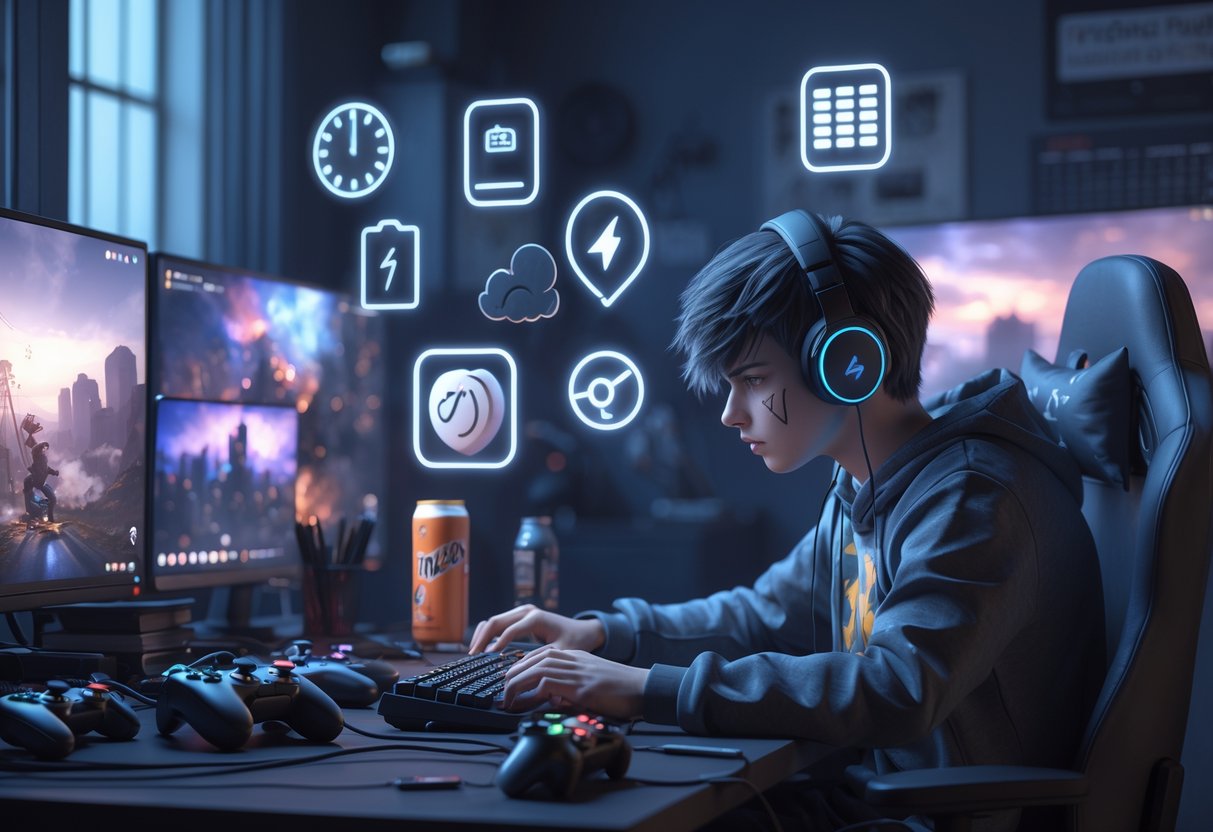
Burnout in gaming usually comes from three big issues. Long sessions without breaks wear you down, and chasing impossible goals just piles on stress and disappointment.
Excessive Gaming Sessions
Playing for hours without stopping just drains you. Your brain needs time to rest and process things, but marathon sessions don’t give it a chance.
Physical problems like headaches, eye strain, and tense muscles show up fast. Some gamers say they’re tired even after sleep, just because their bodies never really relax.
Mental fatigue slows your reactions and clouds your judgment. We’ve seen players lose easy matches simply because they’re running on empty.
The 90-minute rule helps: after every 90 minutes, take a 15-minute break to stretch, drink water, and rest your eyes.
Game companies want you to keep playing. Battle passes, daily rewards, and time-limited events nudge you to stay online longer.
Heads up: If you struggle to stop gaming after a few hours, you might be heading down a slippery slope.
Pressure from Unrealistic Expectations
Setting goals that are just too high creates nonstop stress. Lots of gamers think they’ll hit top ranks or go pro fast, but it takes a ton of time and effort.
Rank anxiety is real. The need to climb or keep your ranking can turn gaming into a slog.
Social media doesn’t help—everyone posts their best moments, not the grind behind the scenes. We see wins, not the hours of practice and failure.
Comparison culture on Twitch or YouTube makes things worse. New gamers expect instant success, forgetting those streamers have years of experience.
The “git gud” mentality can be toxic. It blames struggling players for not trying, ignoring stuff like natural ability, free time, or access to coaching.
Try this: Focus on small, doable goals, like improving one skill each week, instead of aiming for huge rank jumps.
Monotony and Lack of Variety
Playing the same game or genre all the time gets boring and mentally draining. Your brain craves something new, but endless grinding offers none.
Modern games often use repeat reward systems that turn fun into a chore. Daily quests and seasonal events can feel like work.
Genre fatigue hits when you stick to one type of game. If you only play shooters, you miss out on new mechanics or stories.
Many games rely on grinding—repeating the same actions to progress. That keeps you hooked, but not always happy.
Mixing things up helps:
- Stops mental stagnation
- Teaches new skills
- Keeps things interesting
- Cuts down on repetitive stress
Try a new genre every month. If you’re into shooters, maybe give puzzle games, RPGs, or some quirky indie title a shot.
The Role of Healthy Gaming Habits
Building healthy gaming habits is the backbone of burnout prevention. These habits help you draw boundaries, look after your physical wellbeing, and keep gaming fun for the long haul.
Setting Realistic Goals
Let’s be honest—when it comes to gaming goals, most of us overestimate our time and skill. Chasing the top rank in just a few weeks? That’s a recipe for burnout.
Start with achievable daily targets. Instead of trying to climb five ranks in a day, just focus on improving one skill per session. Maybe it’s map awareness today, or just getting your aim a little sharper.
Break big goals into smaller steps. If you want to hit a certain rank, pick out the skills you need and tackle them one at a time. Track progress every week instead of stressing out over daily wins and losses.
Think about your real-life commitments. Gaming should fit around work, school, or family—not the other way around. If you’ve only got two hours a day, don’t set yourself goals that need six.
Celebrate the small stuff. Every tiny win counts, and it keeps you motivated without piling on the pressure. Enjoy those milestones—they add up faster than you think.
Taking Regular Breaks
Taking breaks isn’t just nice—it keeps your body and mind from burning out. We all need a reset, especially during those marathon sessions.
Follow the 90/10 rule: after 90 minutes of gaming, take a 10-minute break. Stand up, stretch, grab some water—anything to get you moving. It’s a simple trick, but it really helps you stay sharp.
Try the 20-20-20 rule for your eyes. Every 20 minutes, look at something 20 feet away for 20 seconds. It’s a quick fix for tired eyes and can help stave off headaches.
Take breaks between matches, too. Don’t just dive into the next game. Step away from the screen for a few minutes. It’s the best way to avoid tilt and come back with a clear head.
Use breaks for light activity. Stretch, take a walk, or do a couple of easy exercises. It keeps your energy up and helps you avoid that stiff, stuck-in-the-chair feeling.
Managing Session Length
If you want to avoid gaming burnout, you’ve got to keep an eye on how long you play. Long sessions usually mean more mistakes and more frustration.
Decide on your session length before you start. Pick a time that fits your day and set an alarm. It’s way too easy to lose track otherwise.
Notice when your gameplay slips. If you’re making more mistakes, getting frustrated, or your reactions slow down, call it quits for now. Sticking it out when you’re tired just makes things worse.
Work gaming into your daily routine. Treat it like any other activity—give it a start and end time. That way, it stays fun instead of taking over.
Listen to your body. Headaches, sore eyes, or an aching back mean you’ve gone too long. Pay attention to those signals—they’re your best warning.
Quality trumps quantity. Two focused hours can be way more rewarding than six hours of distracted play. Short, intentional sessions keep gaming fun and help you improve faster.
Building an Effective Gaming Schedule
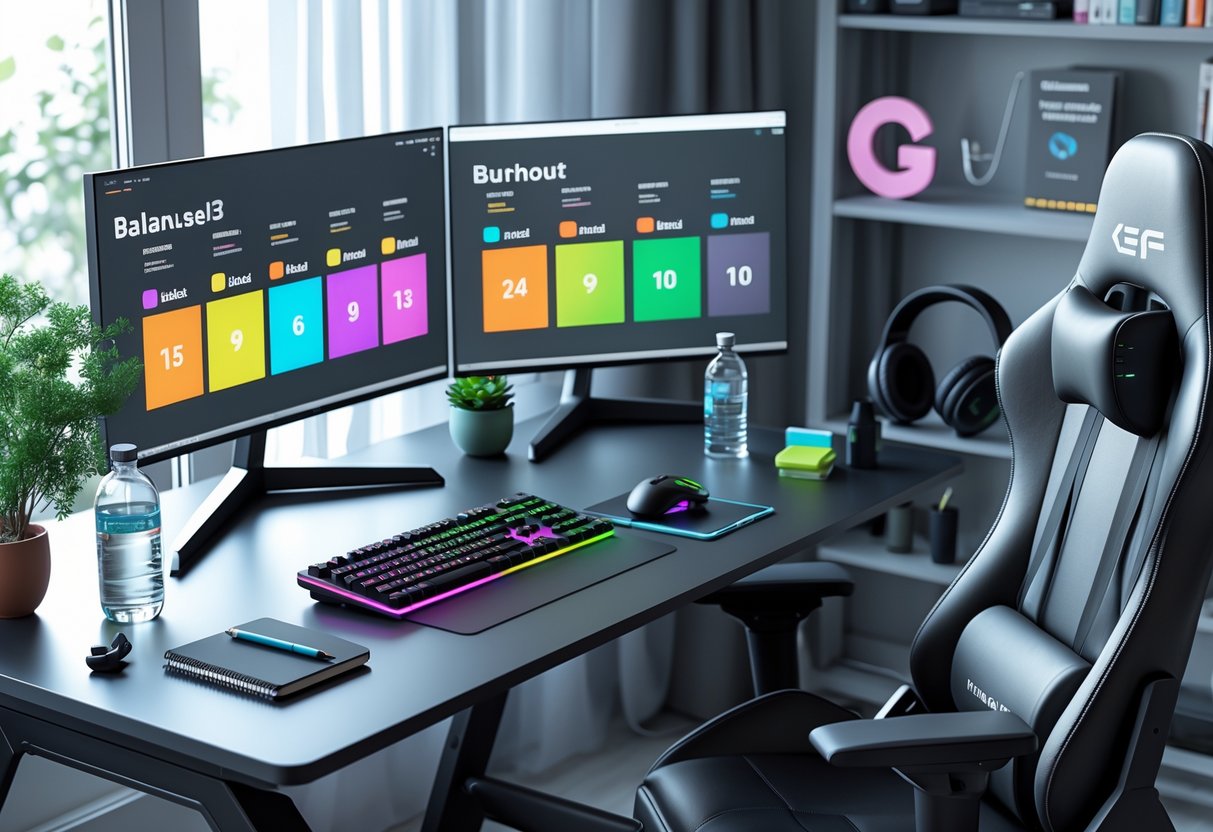
A good gaming schedule keeps burnout at bay and still lets you compete at your best. Smart time management protects both your gaming drive and your overall wellbeing.
Creating Balanced Routines
Keeping gaming and life separate is the real secret to playing for the long haul. I’d suggest the time block method—set aside specific hours for gaming instead of playing whenever the mood hits.
Key routine pieces:
- Gaming blocks: No more than 2-3 hours at a time
- Physical breaks: 10 minutes every hour
- Rest periods: At least one full day off each week
- Sleep schedule: Shoot for a steady 7-8 hours a night
Gamers like Tyler “Ninja” Blevins work in physical activity between sessions. Even a quick stretch or a walk helps.
Quick tip: Set alarms on your phone to remind you to take breaks. Your eyes and mind will thank you.
Pay attention to your energy during the day. Most people play best in the afternoon when reaction times are sharpest. Try scheduling tough practice then if you can.
Time Management Strategies
If you want a solid work-life balance, treat gaming like any serious commitment. Make a weekly plan that includes gaming, personal time, and everything else you’ve got going on.
The 50-30-20 rule helps:
- 50% competitive gaming and practice
- 30% for casual games or other hobbies
- 20% for social activities and rest
Handy time management tools:
- Digital calendars for planning sessions
- Gaming logs to track your hours
- Break timers so you don’t overdo it
Set daily gaming limits that match your goals. If you’re casual, maybe 1-2 hours a day is enough. If you’re aiming for pro level, 4-6 hours with breaks is more realistic.
Heads up: Avoid those marathon sessions over 4 hours. They almost always lead to burnout and worse performance.
Check your gaming hours each week. If you’re always going over, tweak your schedule before you start feeling burnt out.
Maintaining Work-Life Balance for Gamers
A healthy work-life balance keeps gaming from taking over your personal life. The trick is to set boundaries that protect your game time and make sure you handle real-world commitments too.
Avoiding Neglect of Responsibilities
It’s way too easy to let gaming sessions run long. Use timers and scheduling apps to keep your day on track.
Try a Priority System:
- Do essentials first—finish work, school, or family stuff before gaming
- Time block—set gaming hours and stick to them
- Weekly check-ins—see if you’re balancing things well
Say no to gaming invites if they clash with important stuff. It’s okay to skip a session if it’ll mess with your sleep or job.
Lots of gamers use gaming as a reward. Get your responsibilities out of the way, then play without guilt. It’s surprisingly motivating.
Don’t fall for “just one more game.” Set a firm stop time and use alarms if you have to.
Integrating Real-World Activities
Physical activity and social time outside gaming are huge for avoiding burnout. Mixing in non-digital hobbies really helps.
Ways to add balance:
- Physical breaks—take a 15-minute walk between sessions
- Social stuff—see friends for food or get outside once a week
- Exercise—work in stretching or light workouts daily
- Offline hobbies—try reading, cooking, or anything creative
Treat these like you would a raid or tournament. Many pro gamers say exercise boosts their focus and reaction time in-game.
Join a local club or group. It’s a great way to meet people, break up your routine, and keep things fresh.
The Importance of Social Support
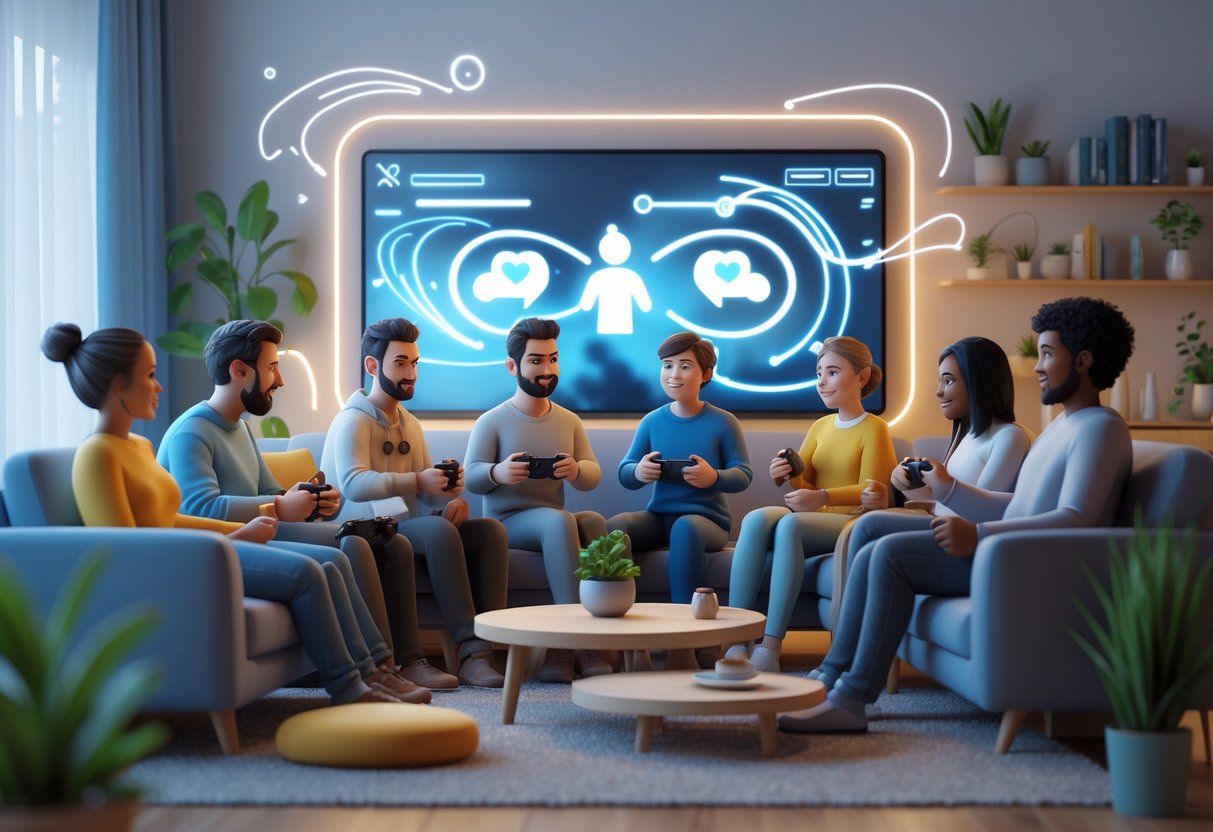
Strong social ties are a real defense against gaming burnout. Gaming communities can drain your energy or recharge you, depending on the vibe and the people.
Positive Engagement in Gaming Communities
The right community makes a big difference in keeping burnout away. Supportive communities share a few things—they give helpful feedback, celebrate wins at every level, and keep things positive.
Healthy communities do this:
- Give constructive feedback, not harsh criticism
- Celebrate progress, no matter the skill
- Hold regular social events outside of matches
- Set clear rules against toxic behavior
Find groups that encourage breaks and a good balance. Some Discord servers even have wellness channels and mental health check-ins.
Communities that focus on learning, not just winning, help keep stress low. When mistakes are teaching moments, people feel more energized and less anxious.
If a community is mostly negative, or playing feels like a chore, it’s probably time to find a new group.
Building Supportive Relationships
Real friendships in gaming don’t happen by accident. You have to go beyond just playing together.
Start by talking about more than the game. Share what’s going on in your life, ask about theirs, or check in if someone seems off. These things build trust.
Quick tip: Set up voice chats that aren’t about gaming. You might be surprised how much you enjoy them.
Meet up in person if you can. Even a quick coffee with a gaming friend adds depth to your friendship and helps keep burnout at bay.
Remember, it’s okay to say no sometimes. Good friends will understand if you need a break—they want you healthy, too.
Adapting Burnout Prevention for Different Platforms
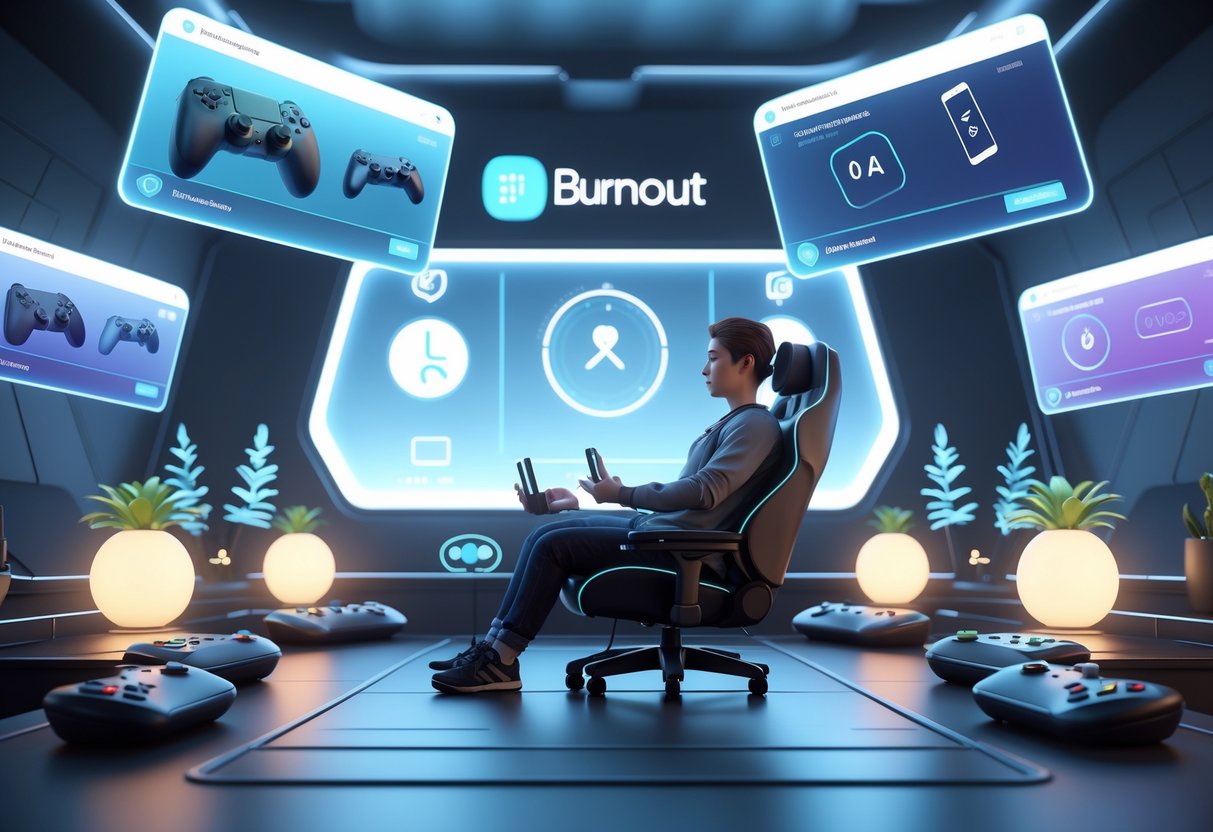
Each gaming platform brings its own burnout challenges. Console gaming usually means longer, more focused sessions, while mobile gaming can sneak in short bursts all day.
Strategies for Console Gaming
Console sessions often run long thanks to comfy setups and bigger time investments. That’s why scheduled breaks matter even more.
Set session limits using your console’s timers or parental controls. PlayStation and Xbox let you set reminders every hour or so—treat these as must-take breaks.
Physically separate your gaming and sleep spaces. Keep your console out of the bedroom if you can. Good sleep habits help fight burnout.
The couch trap is real—suddenly it’s been six hours. Use an ergonomic chair and avoid lounging for too long.
Use achievements as natural stopping points. Finish a campaign chapter or complete a set of matches, then take a break. It feels more satisfying than stopping at a random time.
Approaches for Mobile Gaming
Mobile burnout usually comes from always having games at your fingertips and the pressure to spend money. It’s a different kind of challenge.
Set app restrictions with iOS Screen Time or Android Digital Wellbeing. Limit daily play and schedule downtime, especially during work or before bed.
Turn off most notifications. Only leave on the essentials for your team. All those pings just add stress and make it hard to disconnect.
Make some areas phone-free—especially the bedroom and at meals. It’s easy to burn out if you never really put your phone down.
Budget for microtransactions or just skip them. Spending pressure adds stress you don’t need. Set a monthly limit if you do buy in-game stuff.
Flip on airplane mode during work or study so you’re not tempted to sneak in a quick match.
Burnout Prevention in Esports and Competitive Play
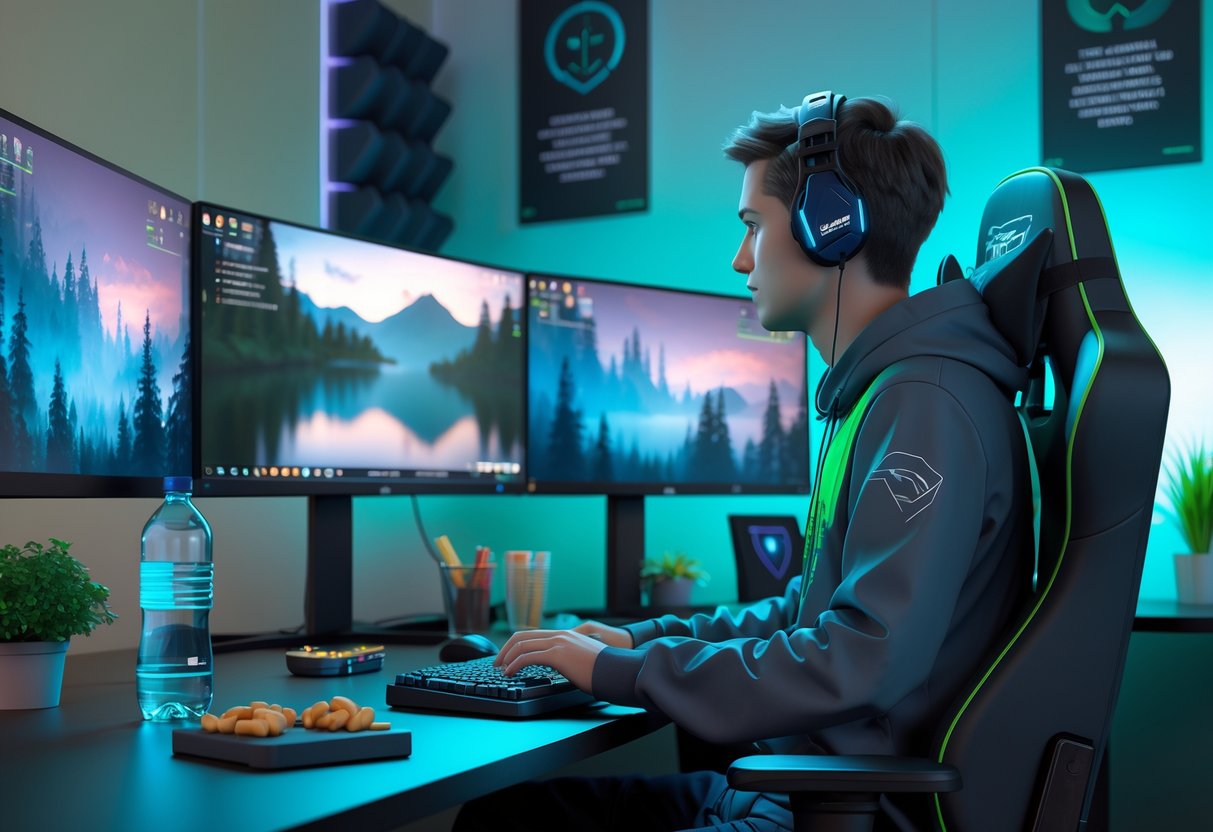
Pro esports players have to handle unique mental and physical challenges. They need structured practice routines and real strategies for mental health.
Managing Practice and Competition Stress
Long practice sessions happen all the time in competitive gaming, but smart scheduling keeps exhaustion at bay. Most pro players train 8-12 hours a day, and that pace can burn you out fast if you skip breaks.
Effective Practice Structure:
- Take a 10-15 minute break every 90 minutes.
- Keep intense practice to 6-8 hours max.
- Set aside one full rest day each week.
- Switch between mechanical drills and strategic review.
Stress during competitions just hits differently than practice. Tournaments crank up anxiety with crowds, cameras, and prize money on the line.
Pre-Competition Strategies:
- Stick to a regular sleep schedule before events.
- Use breathing exercises between matches.
- Watch game footage instead of endlessly grinding.
- Stay off social media during competition periods.
Plenty of players say they perform better when they mix tough practice with lighter gaming. Setting phone alarms for breaks and using productivity apps to track time are simple ways to help.
Mental Wellness for Professional Gamers
Mental health support really matters for a long esports career. Studies show that resilience factors cut down burnout symptoms for competitive players.
Building Mental Resilience:
- Pick up hobbies outside of gaming.
- Keep up with friends who aren’t teammates.
- Use problem-focused coping strategies.
- Stay connected during tough times.
Avoidance coping—just ignoring problems—makes burnout way more likely. Face performance issues head-on instead of hoping they’ll vanish.
Daily Wellness Habits:
- Get at least 30 minutes of physical exercise.
- Eat well and stay hydrated.
- Stick to a regular sleep routine (aim for 7-9 hours).
- Try mindfulness or meditation.
Lots of semi-pros have found that talking to sports psychologists who get gaming culture can make a big difference. These professionals help build coping skills tailored for gaming stress.
Teams should notice when players start feeling less accomplished, since that’s often an early burnout sign. Honest communication between players and coaches helps stop small issues from turning into big problems.
Setting and Adjusting Expectations
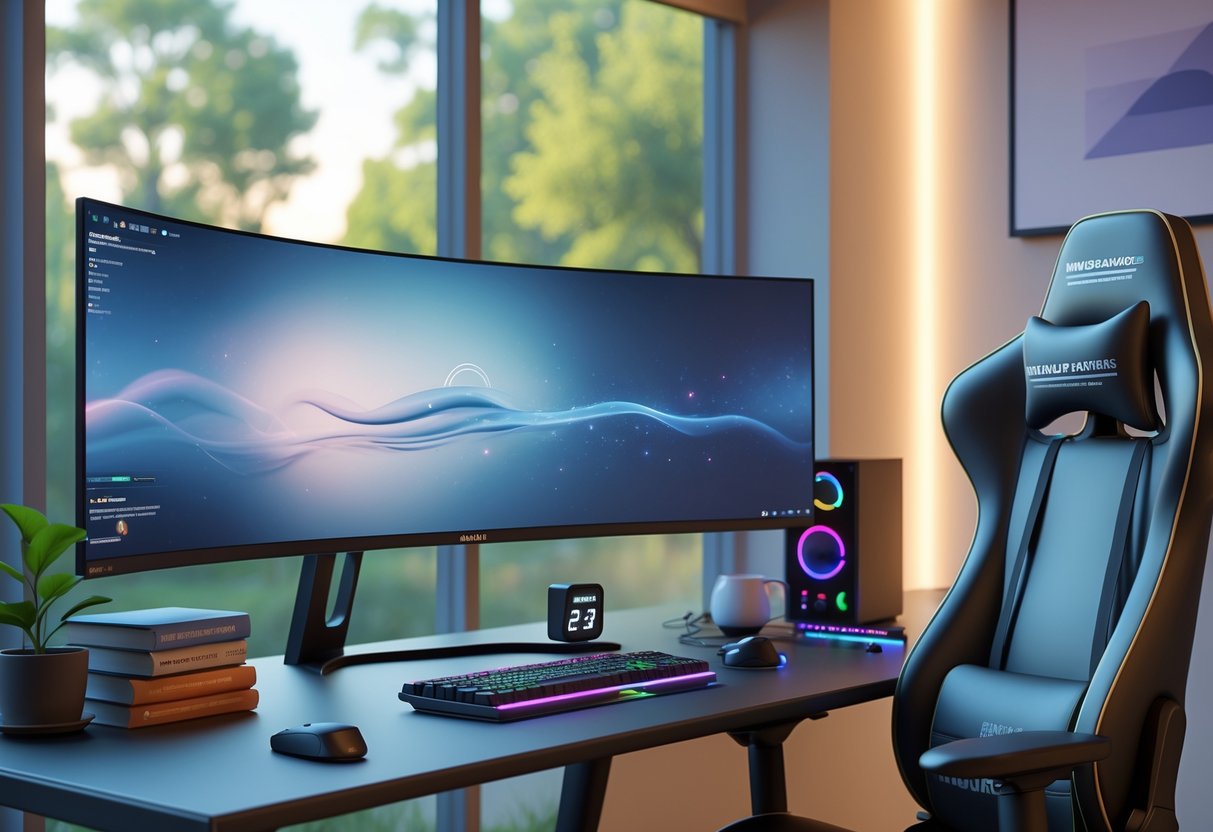
If you want to avoid gaming burnout, managing your expectations is key for keeping a healthy relationship with games. A lot of us set goals that just aren’t realistic, or we overlook our own progress, which only leads to frustration.
Identifying Unrealistic Goals
Unrealistic expectations play a huge role in gaming burnout. We sometimes set goals that sound doable but actually demand way more time and effort than we realize.
Many people want to hit the top rank in competitive games in a few weeks. Realistically, most players spend months or even years climbing the ladder. Another common trap is expecting to play at your best every single session.
Even pro gamers have off days. Setting daily skill improvement targets just piles on pressure. Try focusing on weekly or monthly progress instead.
Avoid comparing yourself to streamers or pros. Those folks play 8-12 hours a day for a living. If you only have a couple hours after work, expecting the same results will just leave you disappointed.
Quick win: Write down your gaming goals and honestly check if they’re possible with your time and skills. Adjust them to be more realistic and specific.
Celebrating Progress and Small Wins
Noticing your progress keeps you motivated and wards off burnout. It’s easy to dwell on what you haven’t done instead of what you have.
Track small wins: better aim, fewer deaths, or picking up new strategies. These little improvements actually matter more than big jumps in rank. A simple gaming journal or an app can help you see your progress.
Set up rewards for hitting milestones. If you reach a new rank, treat yourself. Master a tricky technique? Share it with friends or your gaming group.
Remember that progress in gaming isn’t always a straight line. You’ll hit rough patches, losing streaks, and plateaus. That’s normal—it doesn’t mean you’re failing.
Warning: Don’t shrug off small accomplishments. Stacking up little wins builds your confidence and keeps gaming fun over time.
Sustaining Enjoyment and Motivation in Gaming
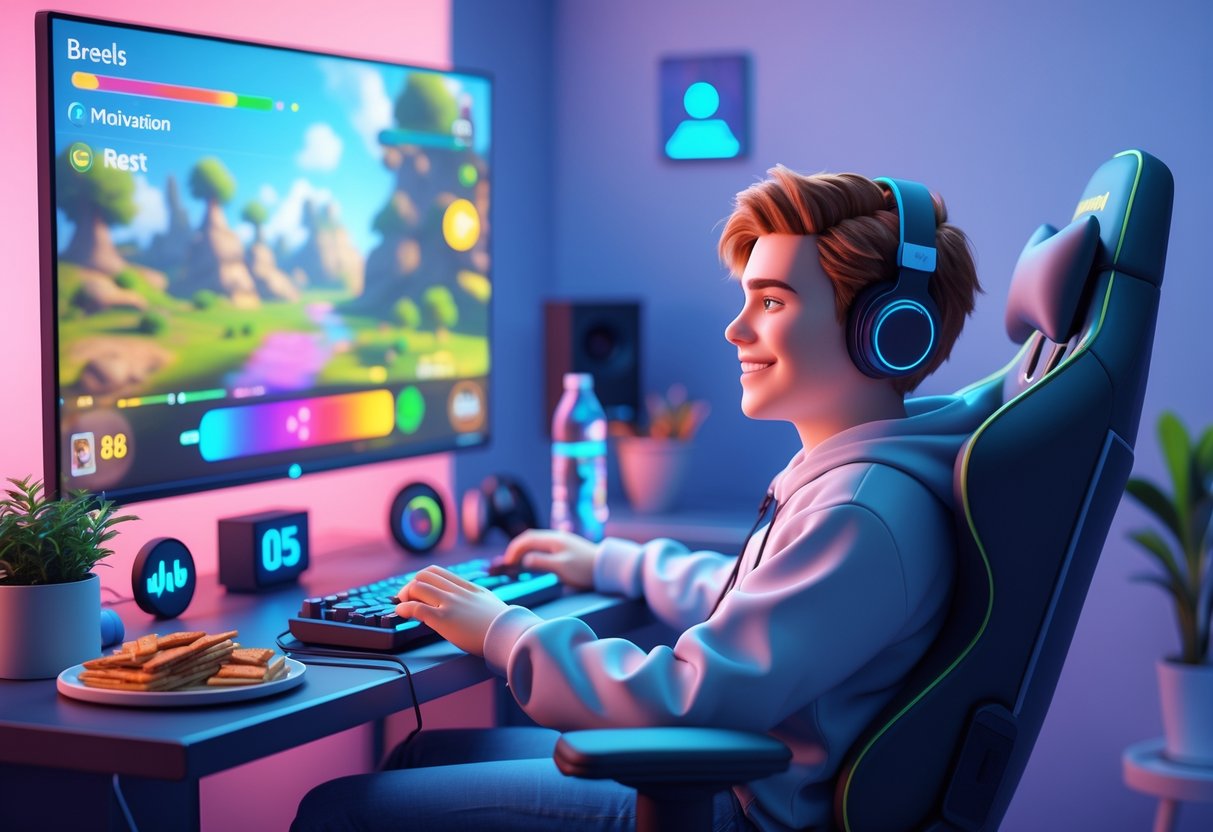
That spark that made gaming fun in the first place can fade with burnout, but you can reignite it with a few changes. Trying new things and remembering what drew you to games in the first place can keep your motivation alive.
Rediscovering Fun in Games
When gaming starts to feel like a chore, it’s time to pause and think about why you started playing. Sometimes, you just need to drop the pressure and focus on having fun again.
Take a break from competitive modes. If ranked matches are stressing you out, switch to casual games. Play with friends who care more about fun than winning. That social side can make a big difference.
Go back to old favorites, but with a twist. Replay games you loved, but try silly challenges or new character builds. You might find fresh excitement in familiar places.
Set goals focused on fun, not achievements. Instead of grinding for the next unlock, try things like “explore every corner of the map” or “use a totally new playstyle.” These goals feel good without any stress.
Play shorter sessions, more often. Swap out marathon gaming for 30-60 minute bursts. You’ll avoid fatigue and keep each session enjoyable.
Trying New Genres and Activities
Exploring new games and activities can totally rekindle your passion and bring new excitement.
Step outside your comfort zone. If you’re always on shooters, give puzzle or strategy games a shot. Different genres challenge you in new ways and keep things fresh.
Check out creative modes and user-made content. Lots of games offer building or editing tools. Making something new uses different skills than just playing through a story or competing.
Watch others play or make content. Sometimes, just watching streams, tournaments, or documentaries gives you new ideas. It can make you see your own games in a whole new light.
Join discovery-focused gaming communities. Find groups that love recommending lesser-known games. You might stumble on a hidden gem with gameplay or stories that surprise you.
When and How to Seek Professional Help
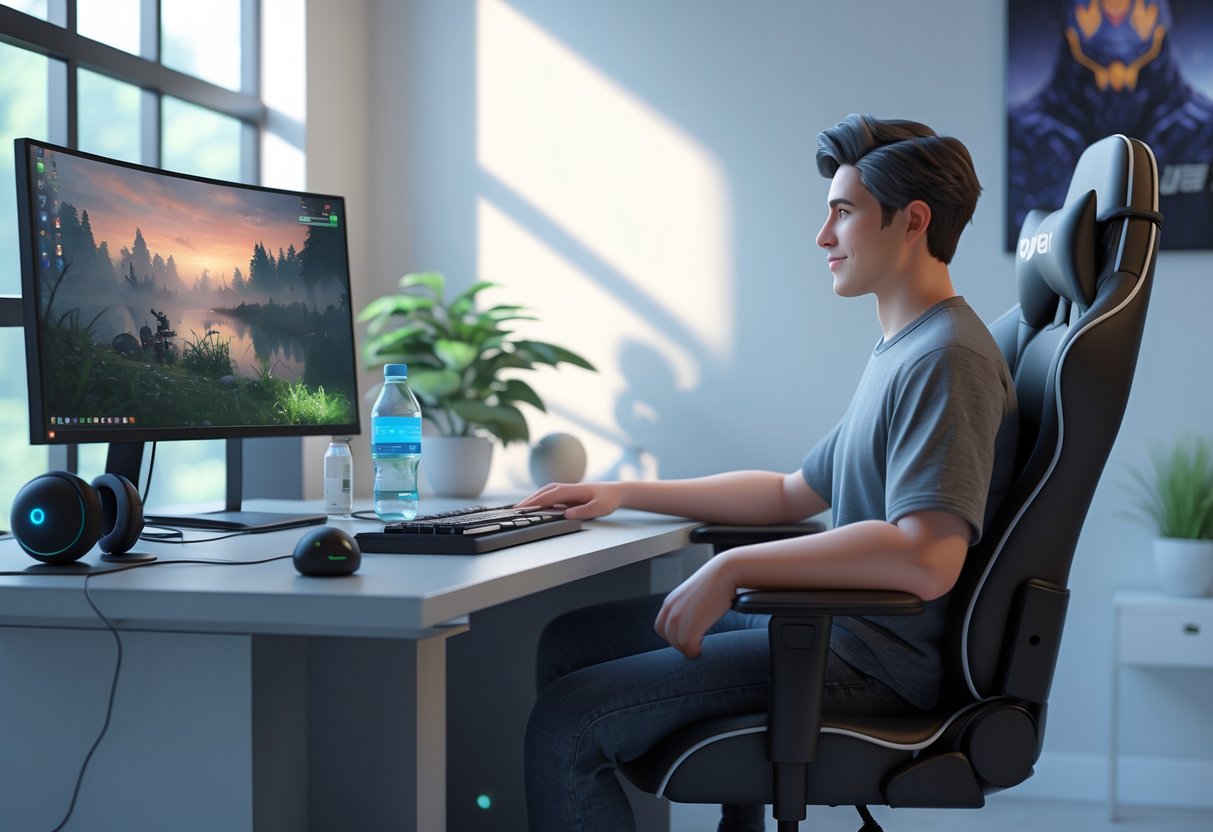
Sometimes gaming burnout isn’t just about being tired or bored. Knowing when you need help and where to get it can be the difference between bouncing back or struggling for months.
Recognising the Need for Support
Physical warning signs often show up first. Headaches, eye strain, or messed-up sleep that doesn’t get better with rest are big red flags.
If you can’t stop gaming even though it doesn’t make you happy, that’s a deeper problem. Some gamers get stuck in a cycle—they keep playing even when they’re not having fun.
Emotional symptoms can include getting irritable, feeling anxious about missing out on gaming, or even feeling down when you’re away from your games. Pulling away from friends and family is another sign to watch for.
Gaming burnout gets serious when it starts messing with your work, school, or relationships. You might miss deadlines, skip out on social stuff, or argue with people about your gaming habits.
Quick assessment: If you’ve tried breaks, new games, and basic self-care but nothing helps, professional help might be what you need.
Resources for Burnout Recovery
Specialised gaming addiction services like Game Quitters offer programs just for gamers. Their 12-week Respawn course guides people through quitting and rebuilding their lives.
Your GP can connect you with counselors who understand gaming stress. More therapists now focus on digital wellness and gaming issues.
Online support communities let you talk to people going through the same thing. Game Quitters’ forum is full of folks facing similar struggles, and there are parent groups too.
Professional coaching isn’t therapy, but it helps with setting goals and changing habits. Some coaches now work just with gamers to help them find balance.
Warning: Watch out for pricey “quick fix” programs that promise miracles. Good support is about steady, lasting change.
Most NHS services are free, but private coaching usually runs £50-100 per session.
Frequently Asked Questions
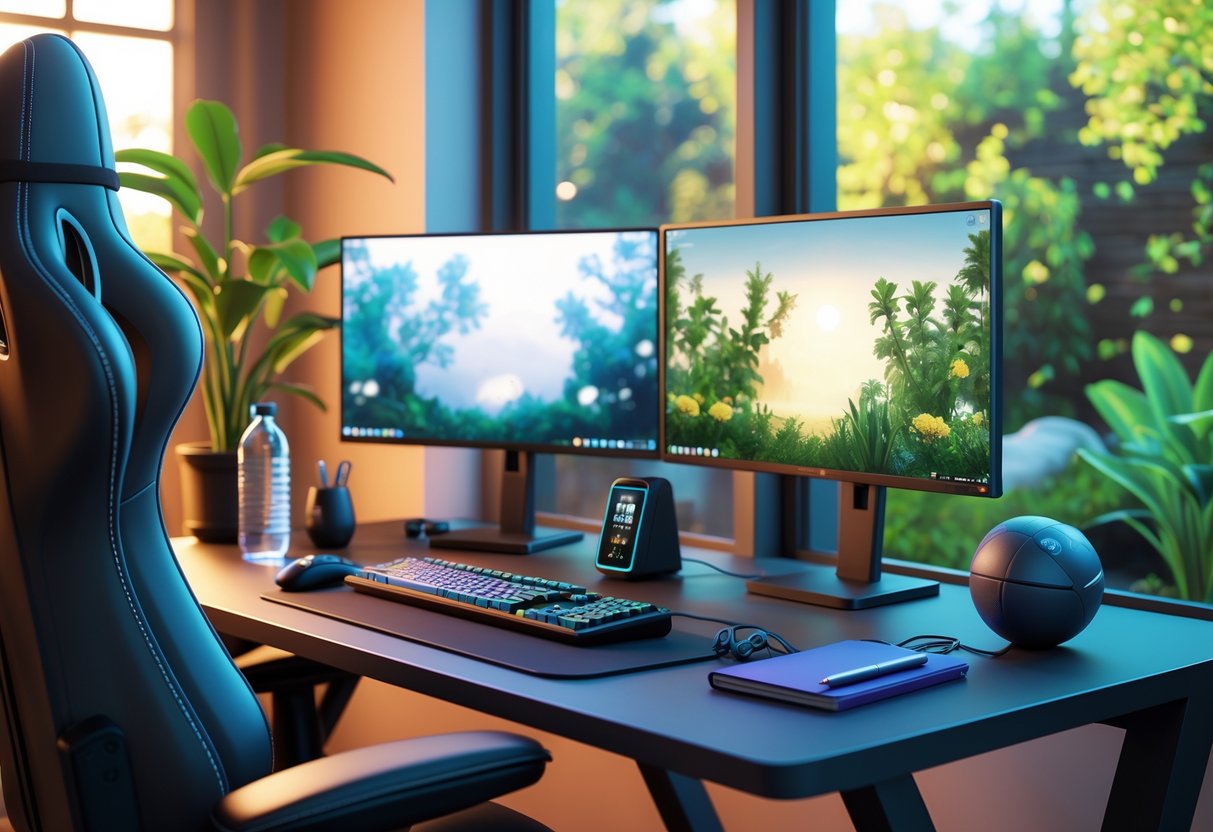
Gaming burnout affects millions, causing exhaustion, emotional fatigue, and the loss of joy in games you once loved. Here are answers to common questions about spotting, preventing, and dealing with burnout while still loving gaming.
What are the common signs that you might be experiencing burnout from gaming?
Gaming burnout brings a bunch of warning signs you can catch early. You’ll feel drained mentally and physically, even after short gaming sessions.
Irritability pops up, especially when things go wrong in-game. You might snap at teammates or just get frustrated way faster.
Physical signs include headaches, weakness, or eye strain. Basically, your body is telling you to take a break from screens.
Losing interest in games you used to love is another big clue. If your favorite titles start feeling like chores, burnout might be creeping in.
Sleep issues often tag along. You might have trouble falling asleep or wake up tired, even if you got enough hours.
Can you suggest some effective methods for overcoming burnout associated with playing video games?
Taking regular breaks really helps with gaming burnout. Try the 20-20-20 rule: every 20 minutes, look at something 20 feet away for 20 seconds.
Set gaming goals that make sense, not impossible ones. Focus on having fun, not just hitting a certain rank or finishing everything under a tight deadline.
Switch up your games. If you’re tired of shooters, pick up a chill puzzle game or a story-driven adventure.
Set up a gaming routine that leaves room for other activities. Mix in exercise, time with friends, or getting outside.
Make your gaming space comfortable—good lighting, a decent chair, and fresh air matter more than you might think.
As a student who enjoys gaming, what strategies can I adopt to prevent burnout from affecting my studies?
Draw clear lines between study time and gaming. Use gaming as a reward after you finish your schoolwork, not as a distraction.
Limit gaming on school nights. Sticking to 2-3 hours on weekdays and a bit more on weekends usually works well.
Pick less intense games during exam season. Competitive multiplayer can pile on stress when you’re already under pressure.
Use short gaming breaks between study sessions. Quick sessions help you reset, but avoid games that are hard to put down.
Watch your sleep schedule. Late-night gaming can wreck your focus in class the next day.
What are some discussions on forums like Reddit highlighting about gamer burnout prevention?
Reddit gamers talk a lot about mixing up their games to keep things fresh. Many keep lists of games from different genres to avoid burnout.
People there say taking full breaks from gaming helps. Some even do “digital detoxes” for days or weeks.
Playing with friends instead of solo comes up often. Social gaming adds variety and keeps things fun.
Reddit users share tips on spotting their own burnout triggers, like getting anxious about rankings or feeling pressure to finish everything.
A lot of threads focus on balancing gaming as fun versus chasing achievements.
What general tips are recommended to avoid feeling burnt out from excessive gaming?
Stay hydrated and eat well during gaming sessions. Keep water close and don’t just rely on energy drinks or loads of caffeine.
Set up your gaming area so it’s comfy. A good chair, eye-level monitor, and decent lighting make a big difference.
Play different types of games. Variety keeps you from getting stuck in a rut.
Listen to your body and mind. If you’re tired or stressed, don’t force yourself to keep playing.
Remember what made you love gaming in the first place. Try to focus on fun, not just grinding for achievements.
In terms of psychology, what practices can one incorporate to minimise the risk of burnout whilst indulging in video games?
Try practicing mindfulness while you game. Stay tuned in to your emotional state and notice if frustration or exhaustion starts to creep in.
Set goals that feel meaningful to you, not just ones based on rankings or outside approval. Focus on enjoying yourself and building your skills.
Learn how to handle gaming frustrations with emotional regulation techniques. Sometimes, just taking a deep breath or stepping away for a bit can help. You might even switch to a more relaxing game if things get too intense.
Keep a growth mindset when you face gaming challenges. If you lose or mess up, treat it as a chance to learn instead of beating yourself up.
Celebrate your small wins and progress. Maybe jot down your best moments or achievements in a gaming journal—it can help you remember why you love playing in the first place.
Make sure to balance gaming with other things you enjoy. Let gaming add to your life, not take it over.

